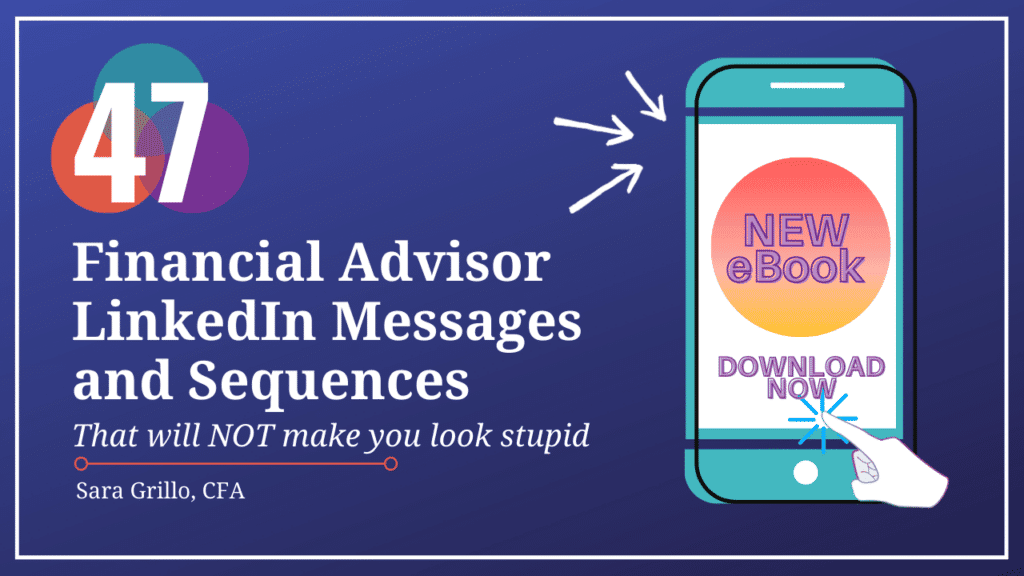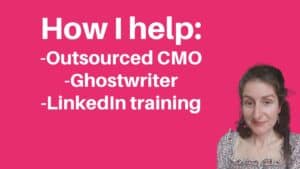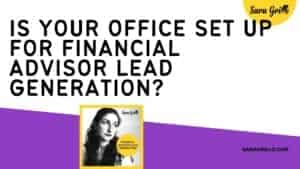Podcast: Play in new window | Download
In this blog/podcast I am going to teach you how financial advisors can create super awesome LinkedIn prospecting messaging and sequences to engage and get new leads.
Are you ready?
But first…
For those of you who are new to my blog/podcast, my name is Sara. I am a CFA® charterholder and I am a marketing consultant for financial advisors. I have a weekly newsletter in which I talk about financial advisor lead generation topics which is best described as “fun and irreverent.” So please subscribe!

Thanks for joining me today! Now that we’re past the pleasantries, let’s get to the point of today’s piece. My goal is to answer the following question: how does a financial advisor create LinkedIn messages and sequences that generate leads for his or her firm?
Key Takeaways
- Quality Over Quantity: Effective LinkedIn prospecting for financial advisors requires personalized, thoughtful communication rather than automated, high-volume messaging. Building genuine relationships takes time and patience.
- Understand the Prospect: The primary goal of initial LinkedIn interactions should be to learn about the prospect’s intentions and objectives. Avoid sending generic, one-size-fits-all messages.
- Logical Messaging Sequences: Messages should be logically arranged (see all of our linkedin scripts for financial advisors), with each message building upon the previous one. Start with rapport-building, followed by engaging questions, and offer valuable content accordingly.
Timing the Meeting Request: Request a meeting only when there is a clear, established basis for doing so, often after observing and understanding the prospect’s responses and interests.
How does a financial advisor create awesome LinkedIn prospecting messages that work?
| Step | Action | Details |
|---|---|---|
| 1. Understanding Prospects | Evaluate Messages | – Track and adjust based on prospect responses. |
| Build Trust | – Pay attention, listen, and avoid impersonal spam. | |
| Focus on Quality | – Interact meaningfully with a smaller, quality list. | |
| 2. Logical Progression | Create Sequences | – 3 messages, 1 per week. |
| Assess Interest | – If engaged, continue or ask for a meeting. If no response, pause for 6 months. | |
| 3. Sequence Content | Message 1: Rapport | – Build rapport. |
| Message 2: Interest | – Ask a key question. | |
| Message 3: Offer | – Provide a lead magnet and assess interest. | |
| 4. Asking for the Meeting | Check Readiness | – Ensure clear signs of interest. |
| Request Meeting | – Use a concise, customized message. Establish a rationale for the meeting. |
Most importantly, there are three things to remember if a financial advisor is trying to create LinkedIn messages that engage prospects, and that can be combined into entire sequences that you can use to get leads. Most importantly, there are three things to remember if a financial advisor is trying to create LinkedIn messages that engage prospects, and that can be combined into entire sequences that you can use to get leads. Let me first say that LinkedIn prospecting messages are often poorly delivered by financial advisors. I’ve been on the receiving end of some of these brash requests to meet for coffee and discuss my SEP IRA, and they stink.
Haven’t you?
And what’s your response. Is it this?
- No, I don’t want to get coffee with you.
- I don’t care if you have been in the business for 20 years.
- Quit asking me if I want to buy a life insurance settlement or the latest hot investment product (I know, I know, it’s the best kept secret and the opportunity will never ever come again…right)
Oh, please.
It makes me wish that everyone who uses LinkedIn Sales Navigator was mandated to read this blog before the first keystroke!
I am assuming you are reading this blog, though, because you want to learn how to do it right, unlike everyone else. Correct?
Lets go!
I’m going to give you three tips for you financial advisors who want meaningful LinkedIn prospecting messages and sequences to use to get meetings. But you must understand that in order to execute upon my teachings you will have to go about this in a way that goes dead against what most financial advisors are taught.
You must embrace:
- Patience
- Sensitivity
- Thoughtfulness
To clarify, let me say this again. If you are looking for overnight success and automated, thoughtless communication, this is not the blog. Please go elsewhere. I’m not the one to teach financial advisors how to send out 300 LinkedIn messages a day using some automated bot or algorithm. Not me!
Because I strongly believe that the biggest enemy of financial advisors who want to grow on LinkedIn is the perception of lack of quality. Come across as the washing machine salesperson and you turn the prospect off instantly. Yet so many of y’all are taking the easy way out, signing up for these spammer services that are offering to blanket your LinkedIn target base with automated messages.
Or signing up for some crappy financial advisor lead generation service that is going feed you pre-qualified leads (supposedly). Good luck! You don’t even want to know my opinion of those.
ALL FINANCIAL ADVISORS WHO WANT TO USE LINKEDIN MESSAGES TO GROW THEIR PRACTICE, PLEASE HEAR THESE WORDS:
Like anything of quality, developing meaningful relationships with prospects takes time, patience, and the ability to exercise emotional control.
-Sara Grillo, CFA
If you have those tools and you are willing to learn new skills that can make it happen, then let’s move forward with you reading the rest of this blog.
If not then adios, amigo or amiga!
Look, there are no LinkedIn scripts for financial advisors. You don’t have a set plan for how to handle every client relationship, do you? No! According to all of you, the work you do is customized for each client. Then why would a prospect be different? Because it’s over social media? Because you’re meeting them through LinkedIn and that’s less personal?
It’s only impersonal because you’re making it be that way, and if you are then you’re never going to get the trust you deserve. And rightfully so because as I keep saying, nobody wants to hire the financial advisor who acts like the washing machine salesperson.
Think about what kind of a value proposition you are presenting as a financial advisor when you act this way! In a recent survey, it was found that **38% of Americans feel stressed about their financial situation** (Eser, 2024). This indicates a significant need for empathetic and tailored financial advice.
Here’s a sneak peak of the three things that your LinkedIn prospecting messages and sequences must have in order to allow you to get meetings and leads.
- They must be feedback-oriented, learning focused communications rather than unilateral broadcasts of your desires, credentials, and solicitations
- Each messaging sequence must be logically arranged and one message within the sequence must lead to the next
- The meeting ask message, the final message in the sequence, should be reflective of the information gained by the financial advisor about the prospect
Now I’ll discuss each of these three concepts in more detail.
By the way, if you want to know the precise words to say, I wrote an e-book called “47 Financial Advisor LinkedIn Messages and Sequences that Will Not Make You Sound Stupid.” You can download it here.

#1 LinkedIn messaging should be viewed as a dynamic testing process between the financial advisor and prospect
Look, you probably have seen some of these messaging companies that want to send out a ton of messages each day and (supposedly) get you meetings. There are these bot things that you can hire to send out a bunch of pre-programmed LinkedIn prospecting messages. Ask for coffee, ask for the meeting, ask to sit down and talk.
If I want to get clients by sending LinkedIn messages, should I just get Sales Navigator and go hit a bunch of people up, daily?
Alright, I’m about to get psycho. There is no clearer way to say this:
HECK NO. RUN IN THE OTHER DIRECTION FROM LINKEDIN SALES NAVIGATOR.
It will make you look like spamming LinkedIn sales schmuck.
What about LinkedIn premium? Should I get that?
Heck no. Nobody reads InMails.
What about LinkedIn paid ads? Should I use those?
Heck no. Even my five year old thinks ads are annoying.
Take these actions TODAY:
- Stop paying for things people hate on LinkedIn.
- Instead go find some people who will love you.
- Love your posts.
- Love your mission.
- Love talking to you on a daily basis.
- Love whatever you will give them.
There’s a gazillion people on the platform. If you’re getting crickets you haven’t tried hard enough to find them.
Or you did find them and you messed it up, probably by foisting one of the “poison pills” on them (see above). Either way, you have some work to do.
People are so standoffish to being approach this way. Occasionally a LinkedIn message may get you a meeting, but it sets up a very bad expectation in the mind of the prospect. Essentially you have made yourself out to be what the public views as the typical financial advisor: a pushy salesperson wanting to sell an annuity.
Financial advisors ask me all the time, “What are some good LinkedIn prospecting messages that I can send in order to get meetings with prospects?”
Let me ask you, did you ever consider that it is impossible to know the right words to say to someone that you know nothing about? That is the place you are starting with most of the prospects you are trying to reach over LinkedIn. The premise of having the right words, some magic sequence to text people, that will work for everyone is wrong because everybody is so different.
Isn’t that how these high net worth individuals want to be seen? As different one from the next? To have special attention paid to them, to be treated with sensitivity? Isn’t that how everyone wants to be treated? Then why would you open up the relationship by showing them that you don’t intend to treat them this way?
Did you know…
Sending a carbon copy prospecting message over LinkedIn is like flashing a neon light saying this:
-Sara Grillo, CFA
DON’T WORRY. THE $10k TO $15k IN FEES YOU WILL PAY ME EACH YEAR WILL GET YOU MUCH BETTER TREATMENT THAN THIS. PAY NO ATTENTION TO MY INITIAL INDIFFERENCE I AM ACTUALLY A LOT MORE SINCERE A PERSON THAN I AM PUTTING ON RIGHT NOW.
Look, there are no magic words to say all the time. It becomes too robotic and too much like a promotion. I have written some LinkedIn scripts for financial advisors – but these are guidelines. They are rough sketches to be followed.
Now, what does a financial advisor who wants to meet prospects over LinkedIn do? You start with a sequence of three LinkedIn messages. Don’t get all caught up in the results, the meetings, your earn out model, and how much in commissions you can make off this person because she is a doctor and you want to sell her disability insurance.
Start here with this.
You have to learn about the prospect as your first move. That is the objective of LinkedIn prospect message sequence #1.
Let me be clear.
The objective of LinkedIn messaging sequence #1 is to learn what the other person’s objectives are in being your LinkedIn connection. Nothing more than that.
-Sara Grillo, CFA
You can not just assume you know why someone is following your page. Some people are connected to you because they want info, others think they may need you the in future and have no real designs on talking to you right now. Others connected to you without any thought and don’t even recognize you are a financial advisor. You have no way of knowing this until you test and see.
By the way, if you are enjoying this blog so far please join my weekly newsletter to receive more content like this!
Every LinkedIn message is an opportunity to learn about the prospect’s intentions
You should look at messaging as a test. Every message is a learning opportunity. You send the message and then you look for feedback as to how the person responded. Learn, observe, and make sure you are tracking what the person does and does not respond to. Take notes and write down how each prospect responds to the particular LinkedIn message you sent, and when they responded.
This is the way to make people feel they can trust you. To pay attention to them, listen to them, observe their behavior, and adjust your communications to all of this in a way that makes them comfortable.
Yes, it takes work.
Paying close attention to other people consumes far more mental energy than most of the tasks we execute as humans on a daily basis. If you are not willing to put in the time to do this, then don’t do it at all – but whatever you do forget about hiring some machine to blast out impersonal LinkedIn spam all the time. It’s not doing the industry any favors.
Hint: You can’t focus on a large amount of people at a time and pay attention to each one. The list can be short. Quality interactions with quality prospects you understand wins over hurling rubbish at people you don’t know.
#2 Logically progress from one LinkedIn message and/or sequence to the next
Have you ever been talking to someone online in a chat portal, I mean maybe it is someone you are talking to a Spectrum mobile about paying your internet bill, and you go from one message to the next with such disconnectedness that you know, you just know, that it is a bot you are talking to instead of a real person?
What’s missing from many of the LinkedIn messaging sequences that financial advisors use is the logic that guides the conversation. It’s rare to see messaging that flows from one idea to the next because the financial advisor is often in such a rush to get the prospect on the phone!
Get the prospect into a meeting!
Sell them whole life insurance!
General guidelines for making your LinkedIn prospecting messaging into a sequence are as follows:
- Start with one sequence of three messages.
- Send one message a week for three weeks
- If they seem to engage, then assess the signals of either 1) time to ask for the meeting or 2) there is some interest, but it is unclear, need to continue message with another sequence until the intentions are clear
- If no response then stop messaging for six months and put them on the unsold list
Now, I can’t tell you the words in each of these LinkedIn sequences – because these are for my members that pay for them. By the way, here is some information below about my membership.
But here are some general guidelines for what the three messages in the first sequence should be about. The messages should all be related one to another within the message triplet, and they should flow from one to the next.
Guidelines to follow
#1 Message rapport builder
#2 Question to peak their interest
#3 Offer lead magnet and if they respond well then try to figure out why they are interested in this
After this sequence it should be clear if they have any interest and if so, in what? Remember, the objective of the first sequence is not to get the meeting. Is it to get to know them. If you do not understand the prospect’s intentions in being your LinkedIn connection after the first sequence, you must run another messaging sequence with different components that what I described above.
Wash, rinse, and repeat until their interest becomes clear. If you can not establish a basis for the meeting, then do not ask for the meeting.
#3 Ask for the meeting only when there is a basis for doing so
Now, let’s say that you proceed through Steps #1 and #2, and the prospect is giving you signs that there is a basis for the meeting. Compose a two sentence LinkedIn message, and ask for the meeting. Don’t take all day asking – get to the point.
The meeting ask messages is the final one in the LinkedIn prospecting sequence. There are a number of different ways you could ask. This must be customized based upon what are you observing from your interactions in the past.
- Humorous
- Direct and High pressure – maybe if you are dealing with a businessowner or salesperson
- Inquisitive, extremely careful
- Low pressure, soft
When you ask for the meeting it is important to establish a rationale for the meeting. If you did Steps 1 and 2 correctly, then you won’t have any problems doing this. If not, you are asking for a meeting with no basis and that increases likelihood of rejection.
Remember that how you close the relationship is a function of how you open the relationship. If you are having problems getting the prospect to agree to meet with you it is probably because there is not enough of a reason in their mind for the meeting. You’ll need to go back into another sequence and in this one focus on getting them exchange more meaningful information that reflects what they truly care about.
Are you financial advisors ready for some LinkedIn prospecting?
What’d ya think? Was this blog on LinkedIn prospecting helpful to you financial advisors?
If yes…

- I am an outsourced CMO for companies who need regular, full service marketing – blogging, social media posts, newsletters, etc.
- I am an hourly consultant for those who just need one-time or recurring guidance
- People hire me as a ghostwriter to write content for a project fee
- I have a social media training program
- I have a book about what to say on LinkedIn messenger
Just letting ya know, in case you need me at some point.
Thanks for reading. I hope you’ll at least join my weekly newsletter about financial advisor lead generation.
See you in the next one!
-Sara G
Sources
Eser, Alexander. 23 July, 2024. WorldMetrics.org Report 2024. Financial Planning Industry Statistics: Revenue Surge, Client Demand Increases. https://worldmetrics.org/financial-planning-industry-statistics





